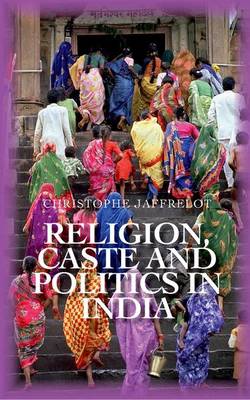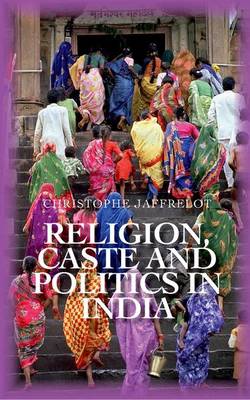
Door een staking bij bpost kan je online bestelling op dit moment iets langer onderweg zijn dan voorzien. Dringend iets nodig? Onze winkels ontvangen jou met open armen!
- Afhalen na 1 uur in een winkel met voorraad
- Gratis thuislevering in België vanaf € 30
- Ruim aanbod met 7 miljoen producten
Door een staking bij bpost kan je online bestelling op dit moment iets langer onderweg zijn dan voorzien. Dringend iets nodig? Onze winkels ontvangen jou met open armen!
- Afhalen na 1 uur in een winkel met voorraad
- Gratis thuislevering in België vanaf € 30
- Ruim aanbod met 7 miljoen producten
Zoeken
€ 145,45
+ 290 punten
Uitvoering
Omschrijving
After Independence the Nehruvian approach to socialism in India rested upon three pillars: secularism and democracy in the political domain; state intervention in the economy; and diplomatic Non-Alignment mitigated by pro-Soviet leanings after the 1960s. These features defined the "Indian model," and even the country's political identity. From this starting point Christophe Jaffrelot explores the manner in which some of these dimensions have been transformed over the course of time, more especially since the 1980-90s. The world's largest democracy has sustained itself by making more room, not only for the vernacular politicians of the linguistic states, but also for Dalits and OBCs, at least after the Mandal Commission report. But the simultaneous--and related--rise of Hindu nationalism has put the minorities--and secularism--on the defensive, and in many ways the rule of law is on trial too. The liberalisaton of the economy has resulted in growth but not necessarily in development: while the new middle class is changing the face of urban India, the rural areas lag behind and inequalities have become more acute. India has also acquired a new global status, that of an emerging power seeking new political and economic partnerships in Asia and in the West, where the United States remains the first choice of the Indian middle class. The traditional Nehruvian system is giving way to a less cohesive but a more active India, a country that has already become what it is against all the odds. Christophe Jaffrelot tracks India's tumultuous journey of recent decades, exploring the role of religion, caste and politics in weaving the fabric of a modern democratic state.
Specificaties
Betrokkenen
- Auteur(s):
- Uitgeverij:
Inhoud
- Aantal bladzijden:
- 600
- Taal:
- Engels
Eigenschappen
- Productcode (EAN):
- 9780199327515
- Verschijningsdatum:
- 16/08/2011
- Uitvoering:
- Hardcover
- Formaat:
- Genaaid
- Afmetingen:
- 3 mm x 3 mm
- Gewicht:
- 4 g

Alleen bij Standaard Boekhandel
+ 290 punten op je klantenkaart van Standaard Boekhandel
Beoordelingen
We publiceren alleen reviews die voldoen aan de voorwaarden voor reviews. Bekijk onze voorwaarden voor reviews.











